
The Mediterranean Games is a multi-sport event organised by the International Committee of Mediterranean Games (CIJM). It is held every four years among athletes from countries bordering the Mediterranean Sea in Africa, Asia and Europe. The first Mediterranean Games were held in 1951 in Alexandria, Egypt, while the most recent games were held in 2022 in Oran, Algeria.

The 1959 Mediterranean Games, officially known as the III Mediterranean Games, and commonly known as Beirut 1959, were the 3rd Mediterranean Games. After visiting Africa and Europe, the Mediterranean Games were for the first time held in Asia in Beirut, Lebanon, thus completing the trio of continents belonging to the Mediterranean Sea.

The 1963 Mediterranean Games, officially known as the IV Mediterranean Games, and commonly known as Naples 1963, were the 4th Mediterranean Games. The Games were held in Naples, Italy over 8 days, from 21 to 29 September 1963, where 1,057 athletes from 13 countries participated. There were a total of 93 medal events from 17 different sports.
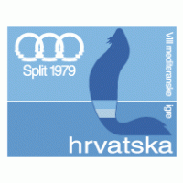
The 1979 Mediterranean Games, officially known as the VIII Mediterranean Games, and commonly known as Split 1979, were the 8th Mediterranean Games. The Games were held in Split, Yugoslavia, from 15 to 29 September 1979, where 2,408 athletes from 14 countries participated. There were a total of 192 medal events from 26 different sports.

Teams from Yugoslavia first participated at the Olympic Games in 1920. Previously, several athletes from Croatia, Slovenia and northern Serbian province Vojvodina had competed for Austria or Hungary when those countries were part of the Empire of Austria-Hungary. A small team of two athletes had competed distinctly for Serbia at the 1912 Summer Olympics.
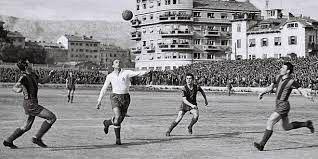
Frane Matošić was a Croatian football player and coach who played as a striker. He is regarded as one of Hajduk Split's greatest players and he is the club's all-time leading goalscorer.

The Serbia and Montenegro men's national water polo team, also widely known as the FR Yugoslavia men's national water polo team, represented Serbia and Montenegro in international water polo games, from 1993 to 2006. It was governed by the Water Polo Association of FR Yugoslavia (1992–2003), then the Water Polo Association of Serbia and Montenegro (2003–2006). The team won medals in the Olympics, World and European Championships, FINA World Cup, FINA World League, Mediterranean Games and Universiade.

Nenad Starovlah is a Bosnian professional football manager and former player. He also holds Cypriot citizenship.
Novica Čanović was a Serbian high jumper who represented SFR Yugoslavia during his active career.
Basketball at the Mediterranean Games has been played consistently since 1951 for men, and 1987 for women. The Yugoslavia national team was the most successful men's team, while the Croatia women's national team being the most successful in the women's competition. Since 2018, the Mediterranean Games has exclusively featured 3x3 basketball.
Football has been played consistently at the Mediterranean Games since the year 1951 for men. Italy and Spain is the most successful team. From 1991, national teams are not allowed, which means only youth teams participate in the tournament.

At the 1997 Mediterranean Games, the athletics events were held at the Stadio San Nicola in Bari, Italy from 15–19 June 1997. A total of forty-three events were contested, of which 23 by male and 20 by female athletes. A total of 24 Games records were broken or equalled during the competition.
Athletics at the 1959 Mediterranean Games were held in Beirut, Lebanon.

Athletics at the 1979 Mediterranean Games were held in Split, Yugoslavia.
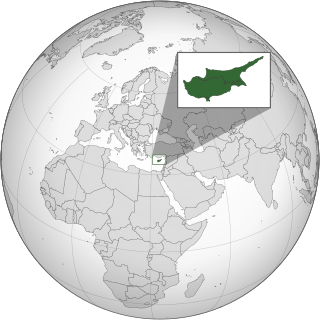
Cyprus–Yugoslavia relations were historical foreign relations between Cyprus and now split-up Socialist Federal Republic of Yugoslavia. Together with Malta, both countries belonged to the small group of European and Mediterranean member states of the Non-Aligned Movement during the Cold War, group which itself part of the larger group of neutral and non-aligned European countries. Two countries shared similar or identical views on many international issues and cooperated closely in the United Nations and at various gatherings of the non-aligned countries. Makarios III participated in the 1961 Summit Conference of Heads of State or Government of the Non-Aligned Movement in Belgrade which was the first official conference of the Non-Aligned Movement.
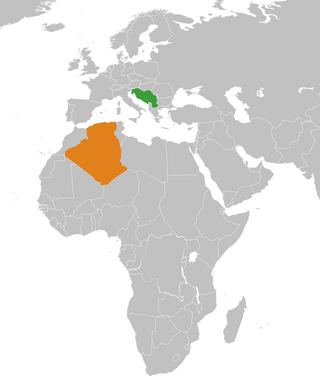
Algeria–Yugoslavia relations were historical foreign relations between Algeria and now split-up Socialist Federal Republic of Yugoslavia. Both countries self-identified with the wider Mediterranean region and shared membership in the Non-Aligned Movement. During the Algerian War Yugoslavia provided significant logistical and diplomatic support to the Algerian side which affected its intra-European relations with France. Yugoslavia was the first European country to openly support the FLN.

Morocco–Yugoslavia relations were historical foreign relations between Morocco and now split-up Socialist Federal Republic of Yugoslavia. Two countries established formal bilateral relations on 2 March 1957. Both countries were founding members of the Non-Aligned Movement. Moroccan king Hassan II supported Yugoslav bid to host the first conference of the movement in 1961 even over the candidacy of Cairo. The belief was that Yugoslav bid will “increase the possibility of wider Arab participation” irrespective of some internal divisions. Yugoslav diplomacy on its part gave high priority to country's relations with non-bloc Mediterranean countries.
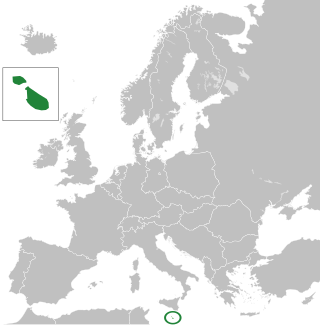
Malta–Yugoslavia relations were historical foreign relations between Malta and now split-up Socialist Federal Republic of Yugoslavia. Together with Cyprus, both countries belonged to the small group of European and Mediterranean member states of the Non-Aligned Movement during the Cold War, group which itself part of the larger group of neutral and non-aligned European countries. The Non-aligned countries in Europe advocated for relaxation of divisions, rejection of superpowers' spheres of influence and for cooperation of diverse countries on the continent. During the Cold War period all three Non-Aligned Euro-Mediterranean countries developed close economic cooperation with the European Economic Community.
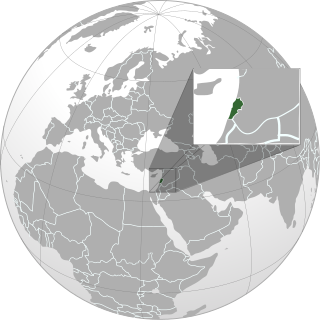
Lebanon–Yugoslavia relations were historical foreign relations between Lebanon and now split-up Socialist Federal Republic of Yugoslavia. Both countries self-identified with the wider Mediterranean region and shared membership in the Non-Aligned Movement. Formal bilateral relations between Lebanon and Yugoslavia were established in 1946. Lebanon participated at the 1961 First Conference of Heads of State or Government of the Non-Aligned Movement in Belgrade. Both countries experienced significant instabilities and conflicts with weak central authorities which in Yugoslav case led to complete dismemberment of federal institutions and violent breakup of the state. Instability in both countries led to the establishment of special courts; the Special Tribunal for Lebanon and International Criminal Tribunal for the former Yugoslavia.
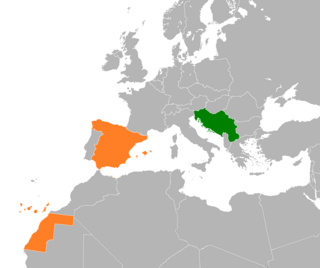
Spain–Yugoslavia relations were post-World War I historical foreign relations between Spain and the now divided Yugoslavia.
















